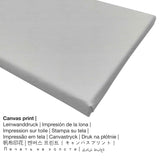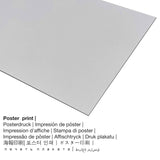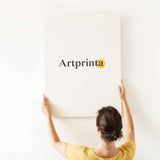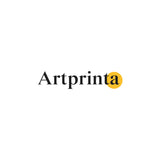Julius Kronberg, 1875 - Nymph and Fauns - fine art print
Tax included. Shipping calculated at checkout.
Summary
In 1875 the male painter Julius Kronberg created this 19th century work of art. The original creation was made with the size: Height: 269 cm (105,9 ″); Width: 130 cm (51,1 ″). Today, the piece of art is included in the digital collection of Nationalmuseum Stockholm. We are glad to reference that this public domain piece of art is being supplied with courtesy of Nationalmuseum Stockholm & Wikimedia Commons.: . On top of that, alignment is in portrait format with an aspect ratio of 1 : 2, which means that the length is 50% shorter than the width.
Additional artwork information from the museum's website (© - Nationalmuseum Stockholm - Nationalmuseum Stockholm)
English: Nymph and Fauns, Julius Kronberg’s breakthrough work, was one of the most popular paintings in Sweden in the 1870s. Kronberg had studied in Düsseldorf and Munich and particularly admired the art of Austrian historical painter Hans Makart. Makart’s love of using colour and sumptuous props to bold effect is clearly reflected in Kronberg’s depiction of the hunting nymph secretly being watched by two fauns. The painting had been shown in Munich to great acclaim in 1875, but when it was shown in Stockholm in 1876, it caused a sensation. Some felt the subject was far too sexually provocative. Other critics saw the painting as an absolute masterpiece that immediately had to be acquired by Nationalmuseum. One of the painting’s greatest admirers was a young August Strindberg, who at that time earned a living as an art critic. In the newspaper Dagens Nyheter, he wrote a lyrical review hailing Kronberg as a “triumphant artist”. Strindberg felt that the Munich School that Kronberg represented stood for a modern style of painting where effects of colour and light were the main feature, while the subject was of subordinate importance. Jaktnymf och fauner, som blev Julius Kronbergs genombrottsverk, hörde till de mest uppmärksammade målningarna i Sverige på 1870-talet. Kronberg hade studerat i Düsseldorf och München och beundrade särskilt den österrikiske historiemålarens Hans Makarts måleri. Makarts förkärlek för starka koloristiska effekter och överdådiga rekvisita avspeglas tydligt i Kronbergs skildring av jaktnymfen som i smyg betraktas av de två faunerna. Målningen hade med framgång visats i München 1875. När den 1876 visades i Stockholm växlade reaktionerna kraftigt. Somliga uppfattade motivet som allt för sexuellt utmanande. Andra bedömare menade att målningen var ett fullödigt mästerverk som omedelbart måste förvärvas av Nationalmuseum. En av målningens största beundrare var den unge August Strindberg, som vid denna tid försörjde sig som konstkritiker. I Dagens Nyheter skrev han en lyrisk recension där Kronberg beskrevs som en ”måleriets triumfator”. Strindberg menade att Münchenskolan, som Kronberg representerade, stod för ett modernt måleri där färgeffekterna var huvudsaken medan motivet i sig var av underordnad betydelse.
Artpiece information
| Piece of art name: | "Nymph and Fauns" |
| Artwork classification: | painting |
| Broad category: | modern art |
| Time: | 19th century |
| Created in: | 1875 |
| Age of artwork: | 140 years old |
| Original size: | Height: 269 cm (105,9 ″); Width: 130 cm (51,1 ″) |
| Museum / location: | Nationalmuseum Stockholm |
| Museum location: | Stockholm, Stockholm County, Sweden |
| web page: | Nationalmuseum Stockholm |
| License: | public domain |
| Courtesy of: | Nationalmuseum Stockholm & Wikimedia Commons |
Artist summary table
| Artist name: | Julius Kronberg |
| Alternative names: | Julius Kronberg, Kronberg Julius, Kronberg Johan Ferdinand, Kronberg Julius Johan Ferdinand |
| Artist gender: | male |
| Artist nationality: | Swedish |
| Jobs: | painter, university teacher |
| Home country: | Sweden |
| Classification of the artist: | modern artist |
| Life span: | 71 years |
| Year of birth: | 1850 |
| Born in (place): | Karlskrona, Blekinge, Sweden |
| Year died: | 1921 |
| Town of death: | Stockholm, Stockholm county, Sweden |
Select your product material
The product dropdown menu ofers you the possibility to choose the size and material of your choice. You can choose among the following product customization options:
- Aluminium dibond print: An Aluminium Dibond print is a print with an outstanding depth. A non-reflective surface structure creates a fashionable impression. The white and bright sections of the artpiece shine with a silk gloss, however without glow. This direct print on Aluminum Dibond is the most popular entry-level product and is an extremely sophisticated way to showcase artworks, since it draws focus on the replica of the artwork.
- Canvas print: The canvas direct print is a printed cotton canvas mounted on a wooden stretcher. It produces the extra look of three-dimensionality. A canvas creates a cosy and pleasing look. Your canvas of your favorite artpiece will allow you to transform your customized fine art print into a large size artwork like you would see in a gallery. Canvas prints are relatively low in weight, which means that it is quite simple to hang the Canvas print without extra wall-mounts. Canvas prints are suited for all kinds of walls.
- Printed acrylic glass (with real glass coating): A glossy acrylic glass print, often described as a plexiglass print, changes the artwork into amazing décor and forms a great alternative option to canvas or dibond fine art replicas. Your own version of the work of art is made with the help of modern UV printing machines. It makes vibrant and impressive colors.
- Poster on canvas material: The Artprinta poster print is a printed canvas with a granular finish on the surface. Please keep in mind, that depending on the size of the poster print we add a white margin of approximately 2 - 6cm round about the painting, which facilitates the framing with your custom frame.
The product specifications
| Print categorization: | art print |
| Method of reproduction: | digital reproduction |
| Production method: | UV direct printing |
| Production: | made in Germany |
| Stock type: | on demand production |
| Proposed product use: | gallery wall, home design |
| Alignment: | portrait alignment |
| Side ratio: | (length : width) 1 : 2 |
| Aspect ratio implication: | the length is 50% shorter than the width |
| Available product materials: | poster print (canvas paper), metal print (aluminium dibond), acrylic glass print (with real glass coating), canvas print |
| Canvas print (canvas on stretcher frame) size variants: | 20x40cm - 8x16", 30x60cm - 12x24", 40x80cm - 16x31", 50x100cm - 20x39", 60x120cm - 24x47", 80x160cm - 31x63", 90x180cm - 35x71" |
| Acrylic glass print (with real glass coating) size options: | 20x40cm - 8x16", 30x60cm - 12x24", 40x80cm - 16x31", 50x100cm - 20x39", 60x120cm - 24x47" |
| Poster print (canvas paper): | 30x60cm - 12x24", 40x80cm - 16x31", 50x100cm - 20x39", 60x120cm - 24x47" |
| Dibond print (alumnium material) options: | 20x40cm - 8x16", 30x60cm - 12x24", 40x80cm - 16x31", 50x100cm - 20x39", 60x120cm - 24x47" |
| Framing of the artprint: | unframed art print |
Important note: We try what we can to depict the art products in as much detail as possible and to illustrate them visually. Although, the colors of the print products, as well as the imprint can diverge marginally from the representation on your device's monitor. Depending on your settings of your screen and the condition of the surface, not all colors will be printed 100% realistically. Since all art prints are printed and processed by hand, there might also be slight variations in the size and exact position of the motif.
© Copyright protected - Artprinta (www.artprinta.com)














